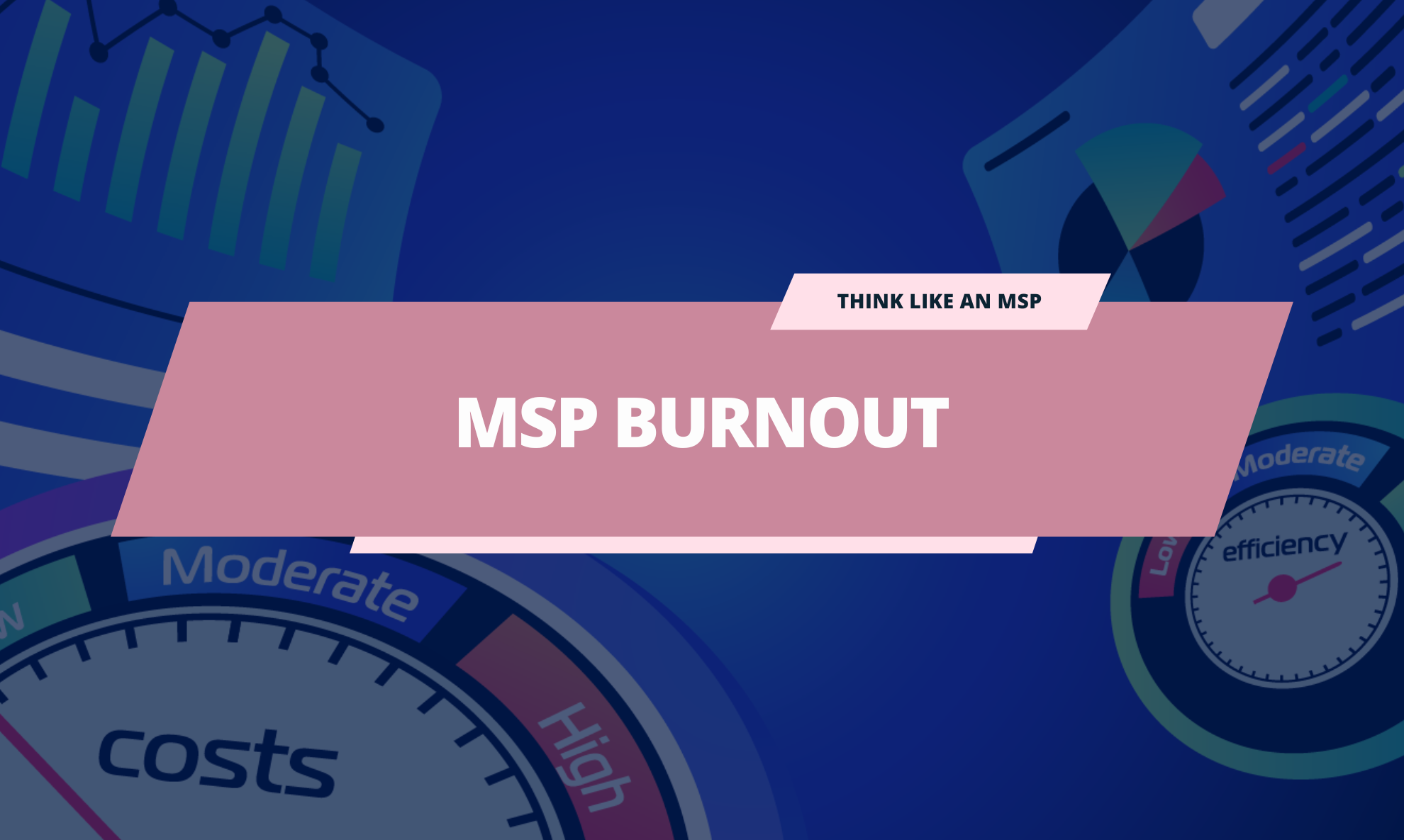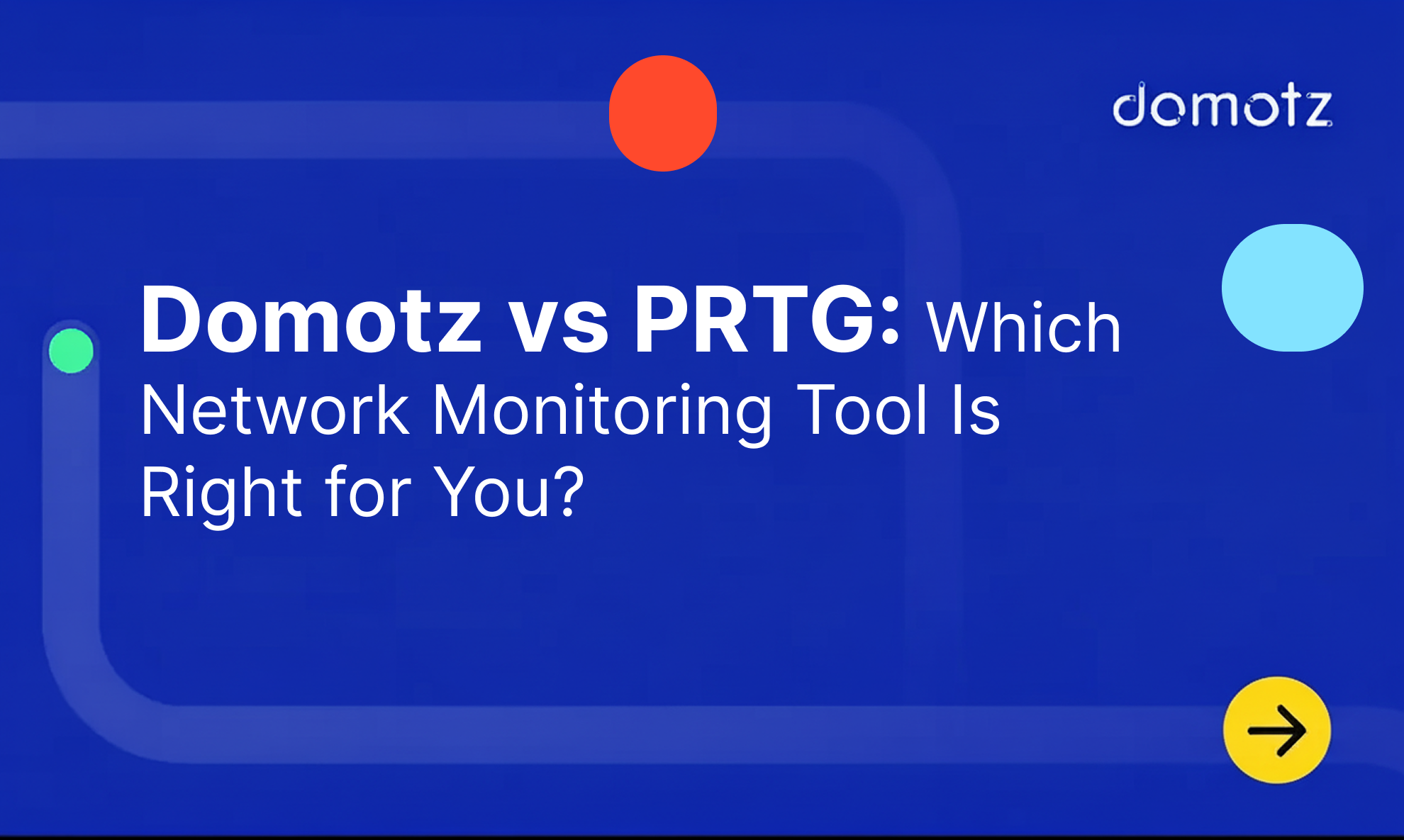Feeling stressed out at work? Find out what you can do when your job stress affects your health to prevent MSP burnout.
Stress affects up to 90% of people says the American Institute of Stress. Moreover, it can impact the activity and function of our genes, causing damaging effects on our DNA. Read more about our MSP Mental Health.
Burnout from job stress occurs in every industry nowadays, but when you run a Managed Service Provider (MSP) business, many contributing factors can lead to high-stress levels. Before the 2020 pandemic, stress and burnout were already commonplace for IT professionals.
So, if you’re feeling the burn of a stressful IT position, you’re not alone. But why does stress matter so much?
In this post, we’ll explain what MSP burnout is and highlight some of the key strategies to help you avoid it.
What is burnout?
Burnout is an occupational phenomenon caused by chronic job stress. In other words, burnout is an extreme form of workplace stress caused by mental and emotional exhaustion.
The World Health Organization (WHO) characterizes burnout by three characteristics:
- emotional exhaustion
- cynicism or depersonalization
- reduced personal accomplishments
Find more about burnout prevention, treatment, and advice for employees & employers.
Why it matters to talk about MSP burnout?
Job stress in an IT role can lead to many problems. In some cases, the issues you face can even cause MSP burnout. You or your employees can suffer from a negative work-life balance, leading you to miss out on things that matter. Ultimately, you can feel drained when it’s time to leave the office or switch your screen off. In terms of job performance, it often leads to lower productivity and a poorer quality of work.
If you work in IT, you may need to focus specifically on MSP mental health tools to prevent MSP burnout. You’ll need the right tactics to manage big projects, stressful situations, and heavy workloads in a way that’s better for your health.
How to recognize MSP burnout
We read a lot nowadays about IT stress and burnout. Now, let’s learn how you can be mindful of burnout and recognize it in yourself and your team members.
Signs and symptoms of burnout may include:
- Physical symptoms: lack of energy, fatigue, headaches, challenges in sleep, and stomach or bowel problems.
- Emotional symptoms: cynism, criticism, self-doubt, loss of motivation, sense of failure, and disillusionment.
- Behavioral symptoms: reduced performance, procrastination, self-isolation, Irritability, or impatience.
If you work in IT, you may need to focus specifically on IT stress management tactics to prevent MSP burnout. This is particularly important if you’re an MSP.
You’ll need the right tactics to manage big projects, stressful situations, and heavy workloads in a way that’s better for your health. However, stress is a normal part of life, so be wise when identifying signs of MSP burnout.
Check out the top burnout statistics and facts that can help you recognize burnout.
How to prevent MSP burnout
Early recognition is fundamental to prevent MSP burnout. Most of all, it’s important to know where to focus your efforts to prevent burnout.
The following five tips can help you organize your work better to help you prevent MSP burnout:
1) Delegate
Delegating is a difficult skill to master for some MSPs and IT professionals. It requires the ability to relinquish control of tasks that are important or even vital for the completion and management of key projects. Delegation is vital to ensure that processes don’t become too time-consuming and that the full team works together to complete tasks. Success delegating will also improve productivity and ensure that everyone on a team is under less pressure overall. Learning how to delegate the right tasks to the right people can be the first step to helping you decrease your stress levels and prevent MSP burnout.
Quick tips on delegating
- Identify what to delegate: Evaluate the tasks that are repetitive and time-consuming for you and start with delegating some of them to chosen team members.
- Deliver feedback: Good work to delegate includes giving constant feedback to your employees so they can learn from your experience and improve their performance.
- Control the big picture: Use network monitoring software to have everything under control. Such a tool can be very useful in enabling you to receive notifications on your network performance. Getting alerts for changes in the network or degradation in network performance can give you peace of mind and help you delegate more.
2) Automate
Delegation requires a larger team and this may not match your budget or your business model. In this case, MSP burnout prevention can start by focusing on automation.
Automating processes will allow you to complete difficult or time-consuming tasks without needing to rely on others. Various tasks can now be automated, from payroll solutions to scheduling and workflow management.
Take advantage of the right software and you’ll have more time available. Automating your daily tasks will ensure you aren’t stretching to the point where things are slipping through the cracks.
Quick tip on automation
Use tools that give you time back. The key to getting the maximum from your team is by allowing them to automate more. Look for a network monitoring platform like Domotz to help with NOC services. There are tons of tools that can help you automate your processes. For example, documentation and data aggregation platforms such as IT Glue or Hudu; Professional Service Automation (PSA), and ticketing systems such as Syncro, ConnectWise Manage, and many more.
3) Communicate
How well do you communicate with your team? Are there often situations of misunderstanding, and why? Think of how communication between teams can be smoother and more efficient.
First, focus on your speech and how you communicate with your team. If you are overly stressed, then adrenaline will pump through your body, speeding up different processes. It will cause you to speak far more rapidly than usual. Your clients and colleagues may notice this, and it could cause your team to completely miss valuable information. Counter this effect by focusing more on your speech. Speak to yourself out loud with a slow and steady space. This can calm you down and help you relax. This method is known to reduce issues with chronic stress, particularly in high-pressure roles like working as an MSP.
Second, create a positive employee environment. Listen to your team, recognize achievements, and give regular feedback.
Finally, participate and provide training for effective communication.
Quick tips on what to avoid to improve communication
- Excessively high workloads and tight deadlines
- Role uncertainty
- Toxic company culture
- Micromanagement
- Aggressive communication
- Closed questions and Judgements
4) Take a Rest
On occasion throughout the day, it is important to ensure that you are stepping away from the desk completely. While this might seem like a simple task, it’s easy for professionals to feel as though systems need constant monitoring with at least one eye on the screen at all times. If you do this, then you can experience burnout. Small breaks can help boost productivity levels and ensure that you don’t feel anchored down. You could even try activities such as desk yoga. This will improve blood flow which can provide a more clear perspective of problems that you are facing daily.
Quick tip on how to rest
If you find out that your cortisol level is at its highest level when you are not able to leave your office, take a rest in front of your computer. Close your email and all opened browser tabs, and open a website where you like to read something pleasant. We hope you can find something interesting in our new blog post category The Fun Side of IT.
5) Reduce Multitasking
Multi-tasking is another reason why you might feel pulling in far too many different directions. Consider eliminating multi-tasking from your daily routine and avoid doing too many tasks at a time. You don’t need to handle all the different jobs yourself. You can rely on experts such as virtual assistants (VAs). The right VAs can handle the various tasks that you are likely managing yourself so you can focus your full attention on one key task that you need to get right. You can also consider outsourcing some of your tasks.
Quick tips on how to reduce multitasking:
- Prioritize: Write all the tasks you need to get done, then separate the urgent from important and connect work to team and company goals.
- Learn to say no: The phone is ringing, and a new email is coming. Stop this before you hear yourself say “yes.” Put your cell phone on silent mode and turn off notifications on your computer. In case of urgency, try to postpone the moment you need to answer and focus on your task. Then, take a moment to evaluate the urgency before making your decision.
Eat the frog: Do your most important work first. Include the most important tasks at the top of your daily agenda. Then avoid everything else until the first task is done, take some rest, and start with the second.
“If you have to eat a live frog, it does not pay to sit and look at it for a very long time!”
Mark Twain
Consider this article about five steps and tips on how to improve your prioritization.
Working as a professional in the world of IT can be rewarding. However, if you are an MSP or running a large team, the right IT stress management practices to prevent MSP burnout will be essential. By reducing stress, you can achieve a healthier work-life balance while guaranteeing that you are ready to deliver the best quality of service to every client.
Where can I get help to prevent MSP burnout?
Being an MSP means you have a lot to do on your own. It’s common thing for you to face highly stressful events every day. Do you see such events as disasters? If you choose to be stress conscious, you can change that and choose how you interpret and respond to these events positively.
Here we put a list of some stress management tips that can help you prevent MSP burnout:
Stress management practices
Find the best strategies and therapies for you to manage your stress levels. You might improve your breathing or start practicing mindfulness. You can try being more self-compassion or simply invest 5 minutes of your time writing the thighs that make you feel grateful. The purpose is to find the right strategies to help you change from negative to neutral or positive. We’ll tell you more – you can decrease your stress levels by learning to talk to yourself in a positive, self-compassionate, and reassuring way.
We recommend checking out the stress management podcast from the American Institute of Stress.
Mental health help for MSP owners
It’s always a good idea to search for help among IT professionals who face the same issues as yours. Talk to a colleague, ask a question, or follow a threat on Reddit. You’ll be surprised how many people suffer from burnout – find them, talk to them. You are not alone.
You can find something interesting by checking out mental health resources for MSP owners from Richard Tubb.
Download Apps for your mobile device
OK, it’s clear that many of you don’t have time to take care of yourself. If this is your case, you can try finding the best app for your mobile to help you reduce your stress levels. Whether you need help combating anxiety or an immersive meditation, you’ll find what you need quickly. Usually, you can start using the app you choose for a few minutes from your time and increase it whenever you are ready.
Check out this list of the top stress management apps that can help you prevent burnout.
To sum up, burnout is a real problem and early recognition is very important especially for MSPs to avoid it. If you live in a situation of excessive work demands, constant exhaustion, and limited job resources, find the right strategies to fight burnout on time. You can start organizing your service provider management by establishing clear objectives, tracking your results, and building healthier customer relationships.
Further reading:



